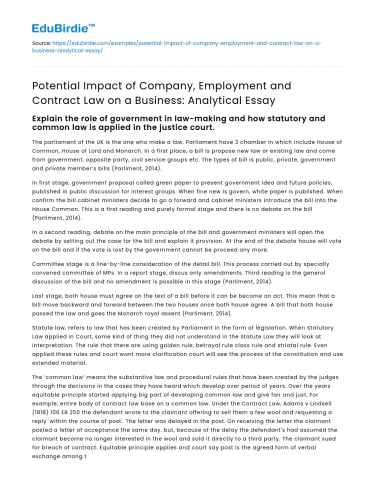Introduction
The intricate relationship between law and business operations is pivotal in shaping the landscape of modern commerce. Company, employment, and contract law constitute the primary legal frameworks that govern the conduct of businesses, influencing their internal and external interactions. These laws provide the necessary structure for businesses to operate efficiently while safeguarding the interests of various stakeholders. The impact of these legal domains is multifaceted, affecting corporate governance, employee relations, and contractual obligations. While these laws facilitate business operations by providing a clear set of rules and guidelines, they also pose challenges that require careful navigation. This essay examines the impact of company, employment, and contract law on business, highlighting their significance, challenges, and implications for sustainable business practices.
Impact of Company Law on Business Operations
Company law, primarily focused on corporate governance, plays a crucial role in defining the legal identity and structure of a business. It establishes the framework within which businesses are created, managed, and dissolved. Key elements include the incorporation process, director responsibilities, shareholder rights, and corporate finance. For instance, the Companies Act 2006 in the UK outlines the duties of directors, emphasizing the importance of acting in the best interest of the company. This ensures accountability and transparency, which are essential for building stakeholder trust. A notable example is the case of Salomon v. A Salomon & Co Ltd (1897), which established the principle of separate legal personality, allowing companies to own assets and incur liabilities independently of their shareholders.
Save your time!
We can take care of your essay
- Proper editing and formatting
- Free revision, title page, and bibliography
- Flexible prices and money-back guarantee
However, the rigidity of company law can sometimes hinder business agility. Compliance with legal requirements can be resource-intensive, particularly for small and medium-sized enterprises (SMEs). Critics argue that excessive regulation stifles innovation and competitiveness. Nonetheless, company law remains indispensable in providing a level playing field and promoting fair competition. As businesses navigate complex legal landscapes, they must balance compliance with strategic goals to achieve sustainable growth.
Influence of Employment Law on Workplace Dynamics
Employment law governs the relationship between employers and employees, setting standards for fair treatment, workplace safety, and dispute resolution. It encompasses regulations on wages, working hours, discrimination, and termination of employment. For example, the Fair Labor Standards Act (FLSA) in the United States mandates minimum wage and overtime pay, protecting workers from exploitation. Employment law ensures that businesses adhere to ethical labor practices, contributing to a positive organizational culture and enhancing employee satisfaction.
In practice, employment law can be a double-edged sword. While it protects workers' rights, it also imposes constraints on employers, potentially leading to increased operational costs. Businesses must navigate the complexities of employment regulations to avoid legal disputes and financial penalties. A well-documented case is that of Abercrombie & Fitch Stores, Inc. v. Equal Employment Opportunity Commission (2015), where the Supreme Court ruled against the company for religious discrimination in hiring practices. This underscores the importance of compliance with employment laws to uphold corporate reputation and ethical standards.
Transitioning from the influence of employment law, the role of contract law in business transactions cannot be overstated. Contracts form the backbone of commercial interactions, providing legal certainty and enforceability. Understanding the nuances of contract law is essential for businesses to mitigate risks and ensure successful partnerships.
Role of Contract Law in Business Transactions
Contract law is the foundation upon which business transactions are built, providing a framework for creating, executing, and enforcing agreements. It ensures that parties involved in a transaction adhere to their commitments, reducing the risk of disputes. Essential elements of a valid contract include offer, acceptance, consideration, and legal intent. The case of Carlill v Carbolic Smoke Ball Co (1893) illustrates the enforceability of promises made in advertisements, highlighting the binding nature of contracts.
Contracts facilitate smooth business operations by outlining the rights and obligations of each party, thereby minimizing uncertainties. However, the complexity of contract law can pose challenges, particularly in drafting and interpreting agreements. Businesses must ensure that contracts are clear, comprehensive, and compliant with relevant legal standards to avoid litigation. The use of boilerplate clauses, while convenient, may not always address specific business needs, leading to potential conflicts.
While contract law provides a robust framework for business transactions, it is essential for businesses to remain adaptable in a rapidly changing economic environment. The integration of technology in contract management, through tools such as smart contracts, offers opportunities for efficiency and innovation. As businesses continue to evolve, the interplay between traditional legal principles and modern technological advancements will shape the future of contract law.
Conclusion
In conclusion, company, employment, and contract law are integral to the functioning of businesses, providing the legal scaffolding necessary for effective governance, fair employment practices, and reliable transactions. While these laws offer protection and predictability, they also present challenges that require strategic management. Businesses must navigate the complexities of legal compliance while pursuing innovation and growth. By understanding the implications of these legal frameworks, businesses can foster a culture of accountability, enhance stakeholder trust, and achieve long-term success. As the business environment continues to evolve, the dynamic interplay between law and commerce will remain a critical factor in shaping the future of business operations.






 Stuck on your essay?
Stuck on your essay?

